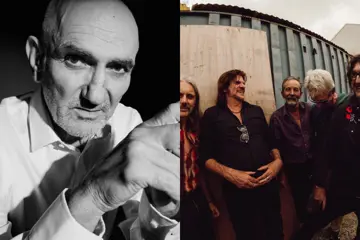 Jello Biafra
Jello Biafraalking to Jello Biafra is the sonic equivalent of being run over by a hurtling freight train. Except in this case, due to the awe-inspiring resume of the man, it's a somewhat pleasurable experience. There are a number of reasons Biafra has managed to stay relevant for so long in the fickle world of punk rock. Most obvious is his very keen intellect. This is someone willing to intelligently challenge unbridled power and corruption in whatever forms they appear.
The second, and arguably more important factor, is the man's restless creativity. Leaving aside his extensive spoken word career, Biafra was never content to rest on his Dead Kennedys laurels. Instead he has spent a good 20 years churning out sonically diverse albums in partnership with the likes of DOA, Nomeansno and Melvins, as well as with his own groups Lard and now The Guantanamo School Of Medicine. White People & The Damage Done is a record of eccentricity that Biafra is extremely proud of. He baulks at any suggestion that The Guantanamo School Of Medicine is something of a 'straightforward' punk rock project that possibly lacks the eccentric sonic flourishes of his more leftfield projects.
“I would disagree with that assessment completely,” spits Biafra. “Yes it's true that I use punk rock as the well from which I spring – or my anchor as you will – but from the Dead Kennedys on I always felt the need to widen the base of the pyramid as I've gone along. No two of my albums have ever sounded alike – not even the Lard albums. If you hear the 20-minute Krautrock bonus track on the Enhanced Methods Of Questioning album or, say, Brown Lipstick Parade on the new album, which is my first swing song – although done in skull-crushing fashion – you'll see that we're still doing things differently.”
So considering that punk rock is meant to be a genre where anything can go, how does he explain the fact that bands who step outside the comfort zone of what's considered the 'punk rock sound' are either criticised or outright ignored? “It has evolved, hasn't it?” offers a thoughtful Biafra. “When I first got to San Francisco in the '70s the first and second generation punk bands were already fired up. The peer pressure then was that no two bands should sound alike. But by the time hardcore hit there was a younger more volatile audience – and sure the dream finally came true that punk cracked America's teenagers – but they brought their teenage hang-ups with them, and that meant a much narrower view of what they liked. They wanted hardcore and nothing but hardcore. When we tried to put on an unknown band like The Butthole Surfers sometimes they'd get booed. And of course before the hardcore kids started liking them their least favourite band in the world was Flipper.
Don't miss a beat with our FREE daily newsletter
“Since then, like any worthwhile underground culture that hits the mainstream when people discover its magic, punk has been commodified and chopped into one stereotypical genre after another. Even underground hardliners like Maximum Rock N Roll share the blame for chopping the music into too many genres so that later generations of fans think they have to fall into all these formulas. 'Oh we're a pyschobilly band so we'll play nothing but pyschobilly.' 'Oh we're a pop punk band so we'll only sound like The Eagles with loud guitars.' And of course don't forget goth punk and hardcore grindcore.”
And how has Biafra avoided the curse of rigidly defining his own art? “I'm thankful that I'm such a weird motherfucker deep down that it didn't ever really happen to me. Even when I was growing up and there were enough wild hippies in my high school… And we were all known as 'freaks'… I was still kind of a freak among freaks. I was really into people like The Stooges and The MC5 and Hawkwind instead of Yes and Emerson, Lake & Palmer and The Grateful Dead. I was my own person and I'm glad I was interested enough and aware enough in the '60s as a child… That I didn't just read about it in history books, I felt it, I experienced it… as it was going on. I was so fed up with bad radio that I just followed my own instincts starting at about age thirteen.”
As well as following his own musical path, Biafra is also happy to weave a unique political path. The world knows about his decades of fighting the regressive forces of conservatism – from Reagan and the PMRC censorship debates in the '80s to Bush in the noughties, the man never stopped raging against the machine. But what's not so obvious has been Biafra's willingness to criticise the forces of the left, whether they be self-interested activist groups or centre-left political parties such as the American Democratic party.
“Well you have to remember that America is a one-party state masquerading as a two-party state. It's run by the corporate party, or the Republocrats – whatever you want to call them. And as I say in Brown Lipstick Parade, Republicans stand for greed, corruption, pollution, bigotry and war while Democrats pretend to feel guilty about greed, corruption, pollution, bigotry and war.
“Sure there is a small caucus within the Democrats… that actually gives a shit and bears some resemblance to the Democratic Party I knew as a kid when there were actual differences between the Democratic and Republican parties… But for the most part they all do what Wall Street, arms manufacturers and the super rich want them to do and that's it. We've been fed one flavour of Reagan after another since he first stormed in and the corporate coup began slowly and incrementally marching on and crushing everything we hold dear.”
And what of Barack Obama – arguably the most progressive person to hold the office of US President since FD Roosevelt in the 1930s? “Obama, I think, has done a couple of good things here and there,” notes Biafra, who recently penned the savagely critical Barackstar O'Bummer about America's Commander In Chief. “I think marriage equality… He finally finds his face to be on the right side.”















